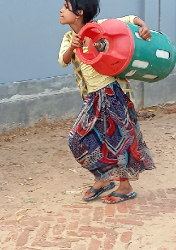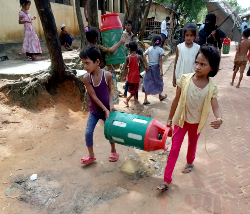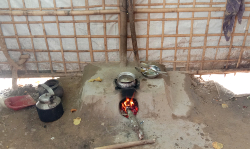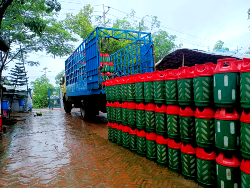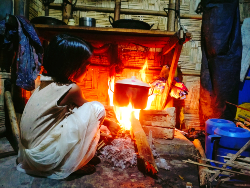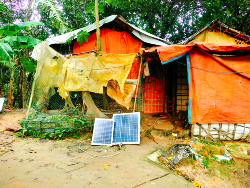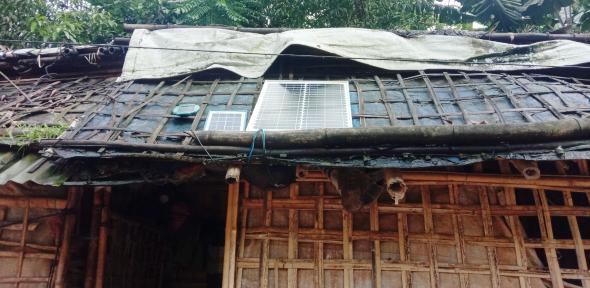
How does energy security and governance look like in refugee settlements?
By Nazifa Rafa
An international research team, led by the University of Cambridge and supported by the Energy IRC Small Grant scheme, embarked on a journey to answer this question in the burgeoning refugee settlements in Cox’s Bazar, Bangladesh.
The Rohingya refugees, who have fled decades of persecution and violence in Myanmar, have been settled in make-shift camps in reserve forests of Cox’s Bazar. In their already fragile contexts, where they lack access to basic services such as food, water, and sanitation, access to clean and adequate sources of energy remain a highly overlooked need.
However, the provision of clean and alternative sources of energy, such as solar panels and Liquid Petroleum Gas stoves, have demonstrated significant interlinkages between:
- Energy, SDG 7 - "Ensure access to affordable, reliable, sustainable and modern energy for all"
- Hunger, SDG 2 - "End hunger, achieve food security and improved nutrition and promote sustainable agriculture"
- Health, SDG 3 - "To ensure healthy lives and promote well-being for all at all ages"
- Education, SDG 4 - "Ensure inclusive and equitable quality education and promote lifelong learning opportunities for all"
- Gender equality, SDG 5 - "Achieve gender equality and empower all women and girls"
- Economic opportunities, SDG 8 - "Promote sustained, inclusive and sustainable economic growth, full and productive employment and decent work for all"
- Sustainable design of shelters, SDG 11 - "Make cities and human settlements inclusive, safe, resilient, and sustainable"
The researchers found that the SDG 7 could be used as an important entry point to ensure that forcibly displaced populations do not get left behind in the world’s path to a just transition.
The research design was heavily influenced by consideration of energy justice, socio-technical farmings of energy systems, and the gender-energy nexus. This work is also a cross-collaboration between Dr Rihab Khalid, Dr Sayed Mohammad Nazim Uddin, (Director of the Center for Climate Change and Environmental Health (3CEH), at the Asian University for Women (AUW).
The work was in part carried out by the 3CEH research assistants, with particular recognition given to the significant work carried out by Omar Salma and Mizana. As members of the refugee community, they were the first batch of Rohingya refugees to have graduated from the AUW. The AUW supports the education of women from marginalized and vulnerable communities, including the Rohingya refugees population, who now make up nearly 10% of the student population.
The Energy IRC award has made it possible for expertise from the fields of architecture, geography, and environmental sciences to collectively explore how marginalised communities interact with energy in spaces of liminality. In refugee scholarship, focus on energy has been widely under-explored, while energy research has primarily been dominated by techno-economic perspectives. Addressing both gaps, the research project supported by this award allowed interdisciplinary researchers from a wide variety of fields to contribute to the field of energy geography and inform policies and future humanitarian efforts in the refugee camps.
This work will be presented in a webinar, focused on 'Sustainable energy for refugee settlements' hosted by the University of Oklahoma. It will also be presented in a workshop on "Education, Environment and Health Situation of FDMN Camps", in Cox's Bazar, funded by the International Development Research Centre, Canada, in the presence of leading Non-Governmental Organisations, working on the crisis, as well as the Cambridge Festival, March 2024.
The Energy IRC was pleased to support this work through its Energy IRC Small Grants Award.
|
Nazifa Rafa is a PhD researcher at the Department of Geography, University of Cambridge. She is an interdisciplinary researcher in environmental and political geography. In particular, her interests lie in different aspects of human-environment interactions, including water and energy security, disaster risks, waste management, and biodiversity conservation in the Global South. Her work has been published in various international peer reviewed journals, including but not limited to Journal of Cleaner Production, Energy Research and Social Science, Sustainability, Frontiers in Energy Research, and Water International. Nazifa Rafa has contributed to the UN report aimed at enhancing the evidence base for synergistic action on climate change and SDGs Related publications: The pursuit of energy in refugee contexts: Discrimination, displacement, and humanitarian energy access for the Rohingya refugees displaced to Bangladesh, (2022, doi: 10.1016) Exploring challenges in safe water availability and accessibility in preventing COVID-19 in refugee settlements (2020, doi:10.1080/02508060.2020.1803018) Drinking Water Security Challenges in Rohingya Refugee Camps of Cox’s Bazar, Bangladesh (2020, doi: 10.3390/su12187325) |


